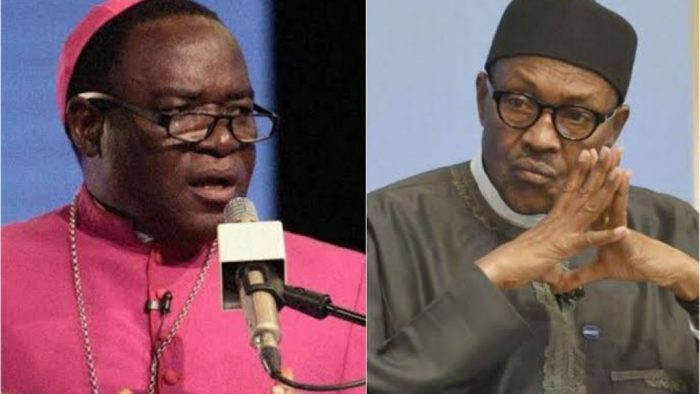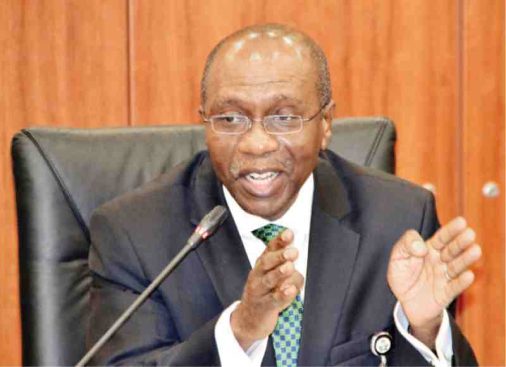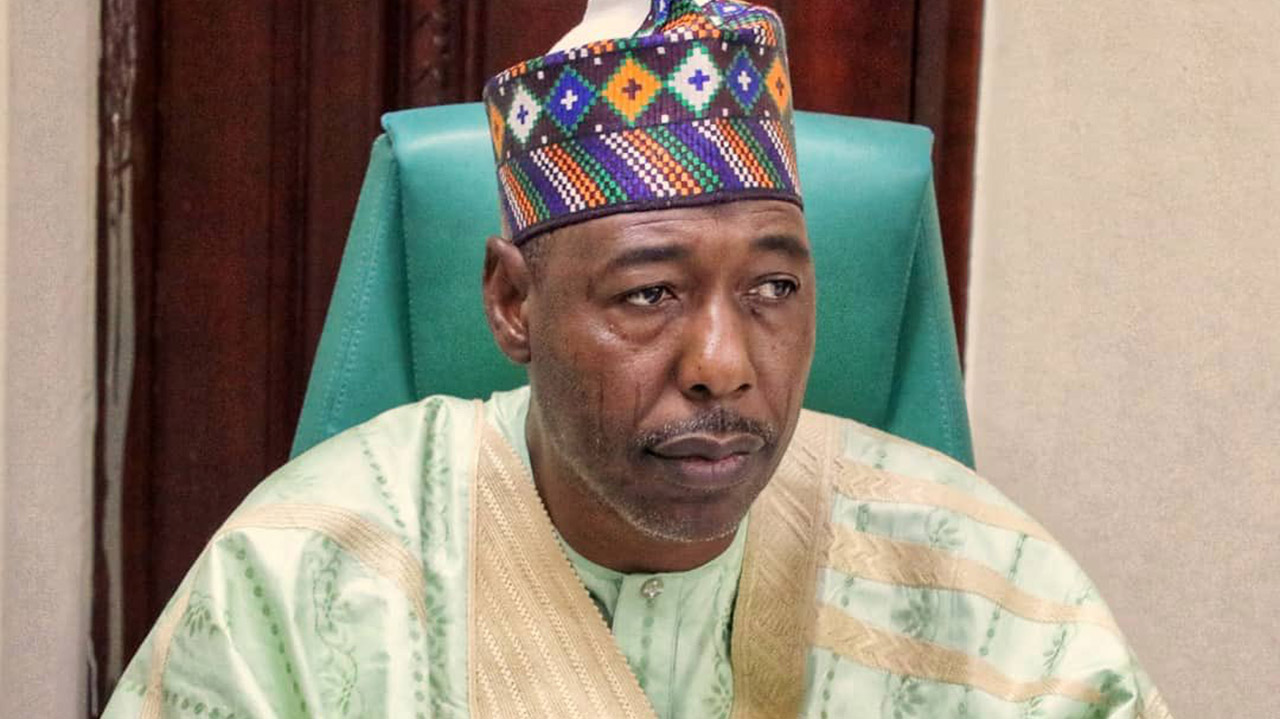Uganda| Between prayer and protest
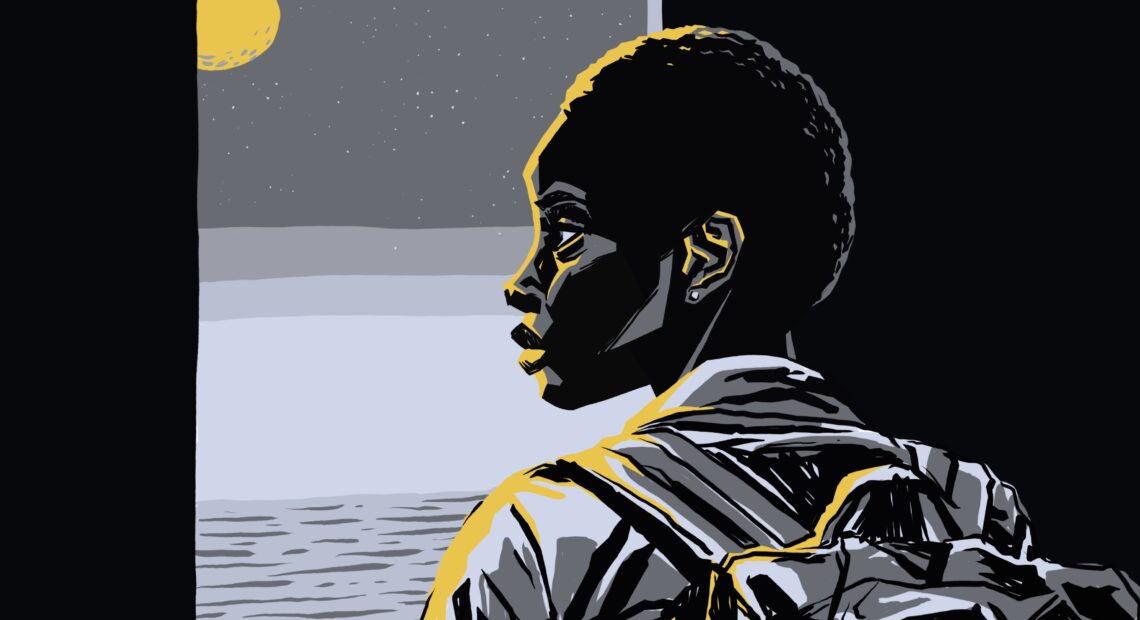
By Emmanuel Mutaizibwa
“He can pray for your visa,” promises apostle Goodwin, from his stage at the Zoe Ministries evangelical settlement on the shores of Lake Victoria, just outside Uganda’s capital Kampala. “Many have been helped already. They have travelled, they are working in the United States. You only have to bring offerings and he’ll work his miracles for you.”
The thousands gathered here on this Tuesday evening await Prophet Elvis Mbonye, he of the white robes, the headphones, and the prosperity miracles that come from his direct connection to God, to do precisely that. Eagerly, they write down their prayers, placing these, together with banknotes, in envelopes, then pass the envelopes to the apostles. The “blessings” don’t come cheap in this middle class congregation: Bronze ones cost the equivalent of US$85; Silver will set you back US$185; Gold US$210; and Platinum US$275.
I believe I can go to the US,” says a young woman
The faithful roar and cheer when the prophet mounts the stage, raises his eyes to the heavens, and starts to pray. “I believe it,” says a young woman next to me, who says her name is Grace Zawedde, with fervour. “I believe I can go to the US.” Her eyes are shining.
On a Tuesday several months later, a woman takes to the stage to proclaim that the offerings she “laid at the feet” of the prophet – who is, according to Religion Unplugged, now worth US$115 million https://religionunplugged.com/news/2023/1/17/in-uganda-prophet-elvis-puts-the-profit-in-prophet- – bore results. Not only was her visa appointment moved forward by ten months, just in time for her flight to America, she testifies, but she also immediately got a job. Among the renewed cheers, no one asks what she is doing back here in Kampala.
Passport demands
Far from the blessed grounds, on the streets of Kampala, people also say they want to leave. Only two out of ten young people whom I randomly ask for their views on migration had no plans to go; eight said that, if given a chance, they would do so immediately. “Life in Uganda is so tough and the cost of living is so high. I would relocate with my entire family if there is a chance,” said George Kagumisha. Andrew Mugyema agreed: “If you want to know (how many want to leave), look at the Immigration Office, where staff now run shifts to meet the demand for passports. The economy is in a bad place.”
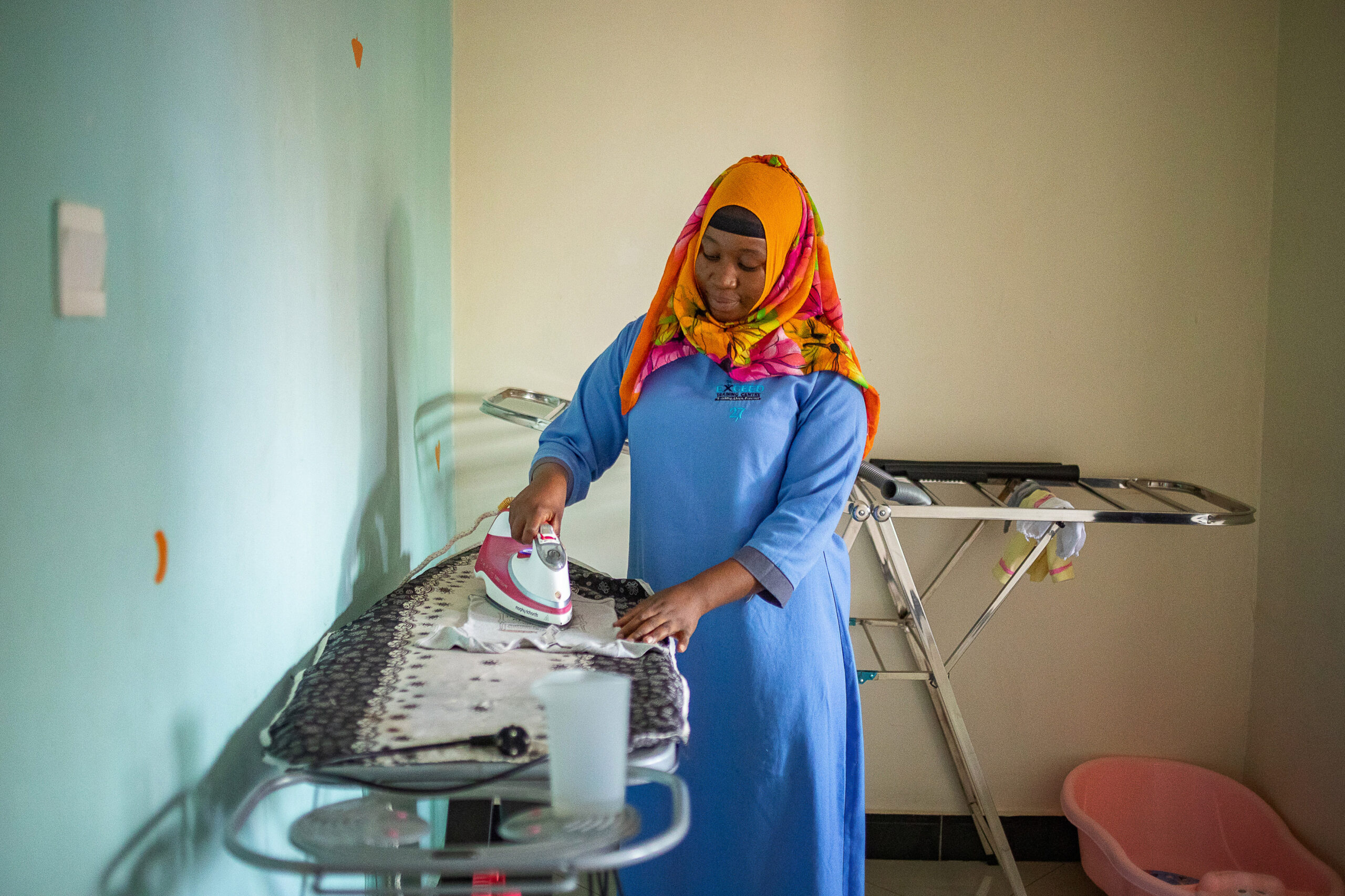
A Ugandan lady is taught how to iron inside a training facility for domestic workers in Kampala, Uganda before embarking on her journey to work in Saudi Arabia as a housemaid. Saudi Arabia and other Gulf states are frequent destination for Ugandan domestic workers. Photo by Badru Katumba
According to the Ugandan Bureau of Statistics, at least 41 percent of Uganda’s youth between 18 and 30, out of a total of around five million young people, are not engaged in any productive activity https://www.monitor.co.ug/uganda/business/markets/41-of-youth-out-of-school-not-employed-says-ubos–4024808. Many of the women among them – according to data from the Ministry of Gender and social development, an average of close to 8,000 each month during 2022 – travel to Gulf nations and the Middle East, either legally or with “agents” in human trafficking syndicates.
You keep thinking you’ll get a salary
I am therefore not surprised when a human rights worker, a friend of mine, reports that she has observed a line of veiled, young, Ugandan women seated in the airport’s departure area. She learned, upon asking an immigration official, that the group was on its way to Saudi Arabia and other Gulf States to take up jobs as domestic workers. The women are apparently undeterred by the dozens of media reports describing slave-like work, abuse, rape, and beatings, not to mention withholding of salaries and passports, but this is not surprising either. Girls like these make up the largest numbers of passengers at the airport each week.
Many in Uganda know the stories, but still go.
My acquaintance Joyce Kyambadde (27) even went back to the Gulf three years after she had experienced a nightmarish eight-month stint in Oman, where she had been beaten, underpaid, transferred between two equally abusive households, made to work long days which included handling biting chemicals without gloves, and sexually harassed. “I went back because things are tough and I thought that working hard could pay off,” she tells me. “You keep thinking that at least you’ll get a salary. There is barely no hope in Uganda.”
Protected from high-up
Instead of trying to create opportunities for the youth in Uganda itself, some of those in power benefit from the traffic. “These girls are protected from ‘high up’, the immigration official tells the human rights worker, about the line of young women at the airport. A 2020 report by the Global Initiative Against Transnational Organised Crime https://riskbulletins.globalinitiative.net/esa-obs-003/02-attempts-to-fight-human-trafficking-from-uganda.html descibes the role of “high ups”, reporting that “attempts to fight human trafficking from Uganda are undermined by corrupt links between bogus (Gulf labour) recruitment agencies and people in positions of power.”
I learn from one woman who made that trip – and recently returned from an ordeal that involved rape – that she was part of a group that went through a “safe house” in Busia district just over the Kenyan border. “A man took our passports and 15,000 shillings (US$39). We were then transported on motorcycles,” she said. “Once over the border, at the house, someone gave the passports back, stamped.”
Uganda operates a “labour externalisation programme
Uganda operates a “strategic labour externalisation programme” which is “to facilitate the (legal) recruitment of Ugandan migrant workers to decent employment opportunities and promote the protection of their rights and welfare in destination countries.” The bilateral labour export agreement with Saudi Arabia was formally suspended in December 2022, over complaints of mistreatment and torture of Ugandan migrant workers, but the practicalities of the suspension, against which many recruitment agencies have protested, are still being debated. Meanwhile, most of the traffic to Gulf states continues to happen through grey channels.
Lucrative business
According to the NGO Migrant Rights, the Gulf state-focused labour recruitment agencies charge between US$600 and US$2,200 per person for aspiring migrants in Uganda https://www.migrant-rights.org/2022/09/exorbitant-fees-entrap-ugandan-workers-in-the-gcc/, while Ugandan remittances from abroad globally amounted to US$1,1 billion in 2022 https://www.monitor.co.ug/uganda/business/markets/uganda-records-shs4-2-trillion-from-remittances-3949628. Uganda’s passports are issued at rate of two thousand daily at US$67, yielding the state US$134,000 per day.
But the economy is only one of the concerns for those who don’t see a future in their home country. Isaac Irumba (35), for example, says in response to my questions about migration that he also fears the political situation. “What if the president departs, God forbid. Are we safe?”
What if the president departs? Are we safe
Political turmoil is indeed a feature of Ugandan society now; the days of stability in the early decades of the rule of strongman President Yoweri Museveni, now 78, are long gone. Museveni’s government became increasingly autocratic since he assumed power as a liberation fighter in 1986, as the country got poorer and – as a result of both bad governance and climate change – drier. In contrast, a small elite around Museveni has amassed much wealth for itself.
This has not gone down well with Ugandan citizens who, at the same time, have become more urbanised, connected to social media, and aware of prosperity and democracy in countries elsewhere in the world. Amid these developments, calls for his departure and a growing political opposition have been at the root of recent mass protests in the country.
In response, the ruler and his executive have relied on security forces to quell dissent. There have already been clashes and deaths on the streets, many disappearances of activists, and cases of torture in police cells https://www.zammagazine.com/investigations/1569-cry-freedom-trends-of-repression-and-resistance-in-five-african-countries.
Suppressed protests
In Kampala in 2022 and partly in 2023, many young doctors have been trying to improve the situation. At least ten marches and pickets demanding better hospital conditions and payment of outstanding salaries took place last year and early this year, while a Twitter campaign called “Uganda Health Exhibition” circulated pictures of medics operating on patients on floors and clinics without roofs.
What irks Ugandan professionals the most is perhaps that, while the public sector is desperately poor, the governing elite continues to live the good life. According to news reports, President Museveni was recently personally allocated the equivalent of 350 million Ugandan Shillings, US$94,000, for bedding, clothes, and footwear for this year alone https://www.monitor.co.ug/uganda/news/national/opposition-mps-protest-museveni-shs1m-daily-expenditure-on-clothing–4239084 . “The big (politicians) are enjoying the best health services. The rest of Ugandans live in abject poverty,” said a protest-tweet – one of many – in the Twitter campaign.
But after a violent clampdown involving beatings, arrests, and tear gas, many of the passionate young medical protesters are throwing in the towel and leaving. Medical intern Judith Nalukwago, who participated in the pickets, told me that she wants to stay in Uganda because she dreams of starting her own hospital and charitable fund to help fellow citizens, but admitted that she now sees many colleagues preparing to leave “as soon as they get their license.”
Many colleagues want to leave as soon as they get their license
In another interview, former Uganda Medical Association president Dr Ekwaro Obuku says he estimates that 2,500 out of the countries approximately 8,000 registered medical doctors, nearly a third, have already left the country to work overseas in recent years.
An empty campus
The blanket of fear has also descended on Kampala’s Makerere University, once a vibrant debating ground for aspiring intellectuals that produced authors and scholars like Ngugi Wa Thiongo and Ali Mazrui. Its campus looks desolate, after critical academics like Stella Nyanzi https://www.theguardian.com/global-development/2022/jan/27/im-free-at-last-ugandas-rudest-poet-stella-nyanzi-on-prison-protest-and-finding-new-voice-in-germany, have either left Uganda after arrest and detention, or have been silenced.
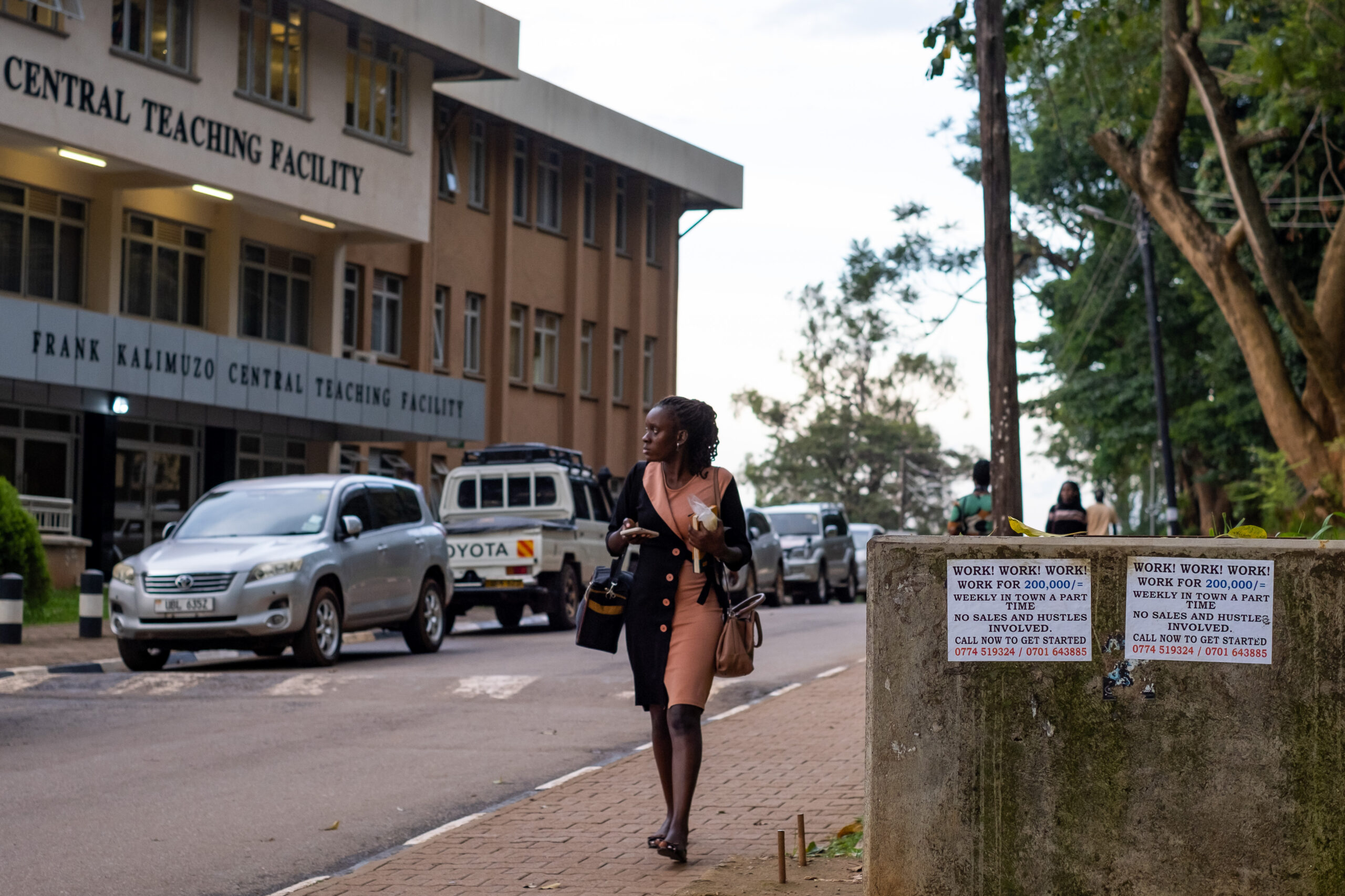
Makerere University Campus. Photo by Badru Katumba
Lecturers who are still here, and who speak to me on condition of anonymity, tell me they are afraid of being victimised by presidential appointees like new Vice Chancellor Barnabas Nawangwe and the new chair of the Appointments Board, President Museveni’s son-in-law Edwin Karugire. “Academics are (now) not freely expressing themselves. This, whichever way you look at it, it is inherently dangerous,” says one.
“Escaped” Makerere alumnus Dr Yusuf Serunkuma, speaking from Germany where he teaches African Studies at Martin Luther University, confirms in an interview that he, too, has noticed a “pervasive fear” among former university colleagues. “The speed at which Prof Nawangwe signs letters expelling dissenting academics and students is mindboggling.” His USA-based colleague, fellow Makerere alumnus Moses Khisa, who is now an associate professor at North Carolina State University, says he feels that this is done on purpose: “Once you capture the intelligentsia, you can rule as you want.”
You die inside as a writer and an intellectual
Meanwhile, Makerere literature lecturer Danson Kahyana’s phone number is never answered anymore. His last article, published in April 2022 in the Ugandan Observer, had contained a report on an assault he suffered after writing articles critical of government. He wrote that he had been trailed and stopped by men on motorcycles, who assaulted him and knocked out his teeth. In the same article, he wrote that his life had changed “in many ways” since then. “You see a potential attacker on every boda boda (motorbike taxi) that passes. But worse than the trauma is self-censorship. You die inside as a writer and as an intellectual.”
Various sources at Makerere concur that they will also leave to join the intellectual brain drain as soon as they “find opportunities abroad.”
Losing hope |The Making of African Migration
Migration is not the West’s problem, it is Africa’s
Where exit is the biggest cash cow
Nigeria | The returnees who leave again
Paying dictators | The Making of African Migration
Cash cows | The Making of African Migration
Migration is not the West’s problem, it is Africa’s
The Insight Report
Nigeria Coverage

